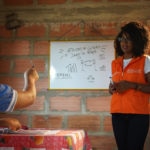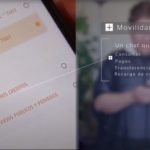Microfinance services during the pandemic: challenging the relationship banking model
To know that they help improve people’s lives is what encourages Roberta, Fernanda, Omar, Yuriem and Teresa to face the day. As part of more than 4,000 microfinance officers of the BBVA Microfinance Foundation (BBVAMF) in five Latin American countries, they reach places where others don’t go, to make financial services more accessible to low-income entrepreneurs who need only an opportunity to develop their livelihoods.

Understanding the entrepreneurs served -the heart of the Foundation- during personal visits to their home-based businesses, is the essence of the relationship banking model, and the basis for microfinance’s effectiveness. It entails accompanying them throughout their alliance with the microfinance institutions (MFI), which creates a bond between them and their officers, allowing for a better knowledge about their needs to be able to support them in the best possible way. This rapport is crucial when faced by important challenges like the uncertainties brought by the COVID-19 crisis.
Since the beginning of the pandemic, the BBVAMF’s institutions in Colombia, Peru, Dominican Republic, Chile and Panama applied the necessary measures to protect the employees’ health, as well as that of the 2.2 million entrepreneurs they serve. Client visits were postponed, but given that financial services have been considered an essential activity in the said countries, office hours have been narrowed and personnel took turns to attend the public.
This shift created two big concerns: on one hand, the officers were worried about the quality of service they could deliver while working from home, and on the other, the entrepreneurs, who were used to a personalized attention from the MFI, were unsure of how to adjust to this new way of communication, while being confronted with the risks faced by their businesses.

In Latin America, the existing digital infrastructure helped mitigate the effects of physical distancing, aided by strengthening the available information and communication technologies (ICT). Despite the gaps, according to ECLAC and CAF, with a digital ecosystem development index of 49.92 over 100, the level digitalization and the regulatory adjustments in the region have allowed for a higher capacity to cater to the current connectivity demands and the increased network traffic.
For the Foundation’s MFIs, WhatsApp, social media, digital banking apps and virtual meeting platforms, are some of the most widely used tools to manage the reigning uncertainty and to facilitate the adjustment process towards the new reality.
According to the head of BBVAMF’s mobility project, Rosa Latorre, this experience shows that, “First, our entrepreneurs are very strong and resilient when faced by drastic changes: when we started the project, we estimated that it would take them one year to assimilate the digital tools, but they’ve done it in two months. Second, with innovation in our DNA, we have learned by looking towards the future: even before the pandemic, we have already consolidated a common collaborative working environment, which has made the transition to working from home much easier for all of the Group’s employees.”
"Our entrepreneurs are very strong and resilient when faced by drastic changes"
As entrepreneurs and officers settle in this new routine, the previous client information and knowledge about their communities have also been useful to test other forms of accompanying them: in Colombia, call centers and WhatsApp have been used as another way to explain how the available digital banking apps work; in Peru and Dominican Republic, social media has been reinforced as another service channel; in Chile, village bank meetings have been replaced by video conferences with special training sessions. Lastly, in Panama, community leaders are now bridging MFIs and entrepreneurs who live in very remote areas. As a matter of fact, BBVAMF’s local institution in this country is using traditional mass media such as the radio, to keep their clients informed, especially those residing in areas with weak satellite coverage.
This way, for Robert, Fernanda, Omar, Yuriem, Teresa and the rest of the officers, considered as the soul of the Foundation, the distance with the entrepreneurs they attend to is only physical, because their calling to serve and their understanding of the situation, cultivated through their relationship overtime, is stronger than ever. Thanks to digitalization, no pandemic can separate the heart and the soul of the BBVAMF.